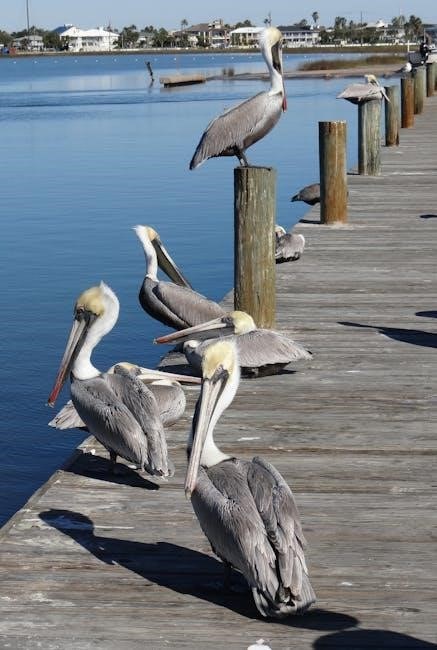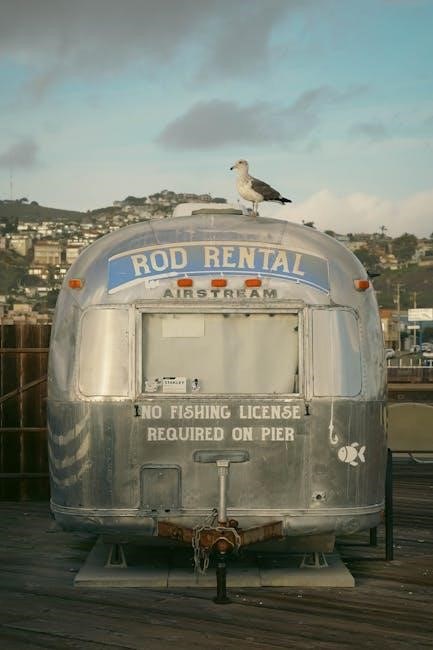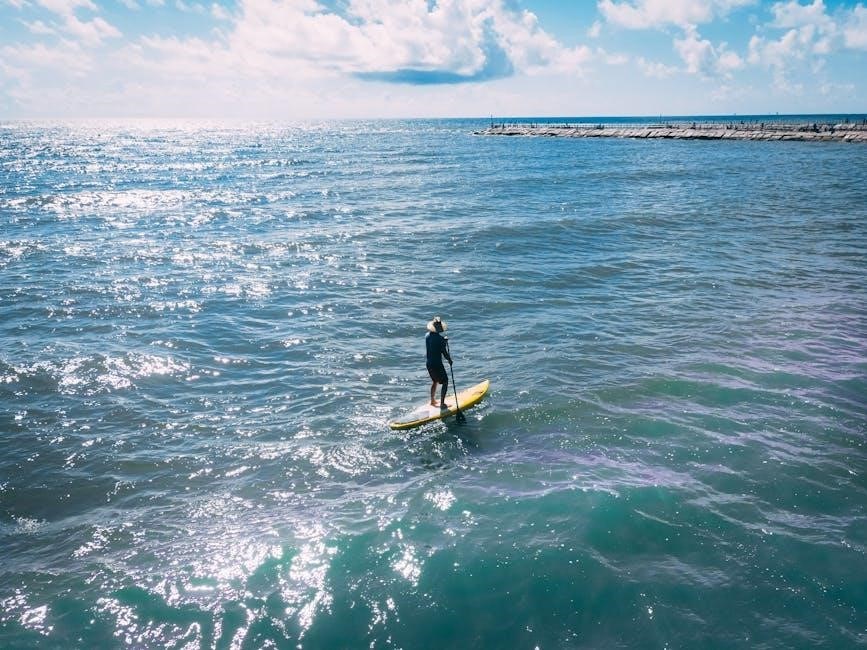In Texas, a Fishing Guide License is essential for directing fishing trips, ensuring compliance with state regulations, and supporting conservation efforts. Issued by the Texas Parks and Wildlife Department, it promotes sustainable fishing practices and responsible outdoor recreation.
Overview of the Importance of Licensing
Licensing is crucial for maintaining sustainable fishing practices and ensuring responsible outdoor recreation in Texas. A Fishing Guide License verifies that guides operate legally, adhering to state and federal regulations. It supports conservation efforts by generating revenue for fish population management, habitat protection, and public education. Licensing also helps regulate the fishing industry, preventing overfishing and promoting ethical practices. By requiring guides to meet specific standards, it ensures a safer and more enjoyable experience for clients. Ultimately, licensing fosters a balance between recreational and commercial fishing, preserving Texas’s natural resources for future generations. It is a cornerstone of environmental stewardship and sustainable tourism.
- Ensures compliance with fishing regulations.
- Supports conservation and habitat protection.
- Promotes ethical and sustainable fishing practices.
Brief History of Fishing Licenses in Texas
The requirement for fishing licenses in Texas dates back to the early 20th century, aimed at managing fish populations and promoting conservation. The Texas Parks and Wildlife Department (TPWD), established in 1963, oversees licensing to ensure sustainable fishing practices. Initially, licenses were simple permits, but over time, they evolved to include specific categories like freshwater and saltwater designations. The introduction of the Fishing Guide License was a significant milestone, regulating commercial fishing operations. Historical data shows that license fees have been instrumental in funding conservation projects and improving public access to fishing areas. Today, licensing remains a vital tool for balancing recreational and commercial fishing interests while protecting Texas’s aquatic resources for future generations.

Types of Fishing Licenses in Texas
Texas offers All-Water Fishing Guide Licenses, Freshwater Fishing Guide Licenses, and One-Day Fishing Licenses, each tailored to specific fishing activities and durations, ensuring flexibility for diverse angling needs.
Resident vs. Non-Resident Licenses
In Texas, resident and non-resident fishing licenses differ significantly in cost and eligibility. Residents, defined as individuals who have lived in Texas for at least six months, pay lower fees, with freshwater licenses costing $30 and saltwater licenses $35. Non-residents, however, face higher charges, typically around $68 for a freshwater license. This pricing structure reflects Texas’s effort to prioritize access for its residents while managing resources for visitors. Both licenses allow anglers to fish in designated areas, but non-residents often opt for shorter-term or one-day licenses, priced at $16, to reduce costs. Understanding these distinctions is crucial for anglers planning fishing trips in Texas, ensuring compliance with state regulations and resource management goals.
All-Water Fishing Guide License
The All-Water Fishing Guide License is a comprehensive permit that allows guides to operate in both freshwater and saltwater areas across Texas. It is mandatory for anyone conducting paid fishing trips in state waters, including bays, estuaries, and coastal regions. The license costs $210 for Texas residents and $1,050 for non-residents, reflecting the state’s effort to manage resources effectively. This license ensures guides comply with all fishing regulations and promote sustainable practices. Additionally, holders must possess a valid fishing license and pass a background check. The All-Water license is essential for professional guides, enabling them to legally and responsibly lead fishing charters in Texas’s diverse water systems while contributing to conservation efforts.
Freshwater Fishing Guide License
The Freshwater Fishing Guide License is designed for guides operating exclusively in Texas’s freshwater areas, such as lakes and rivers. It is a cost-effective option for professionals focusing on inland fishing trips. Priced at $120 for residents, it is more affordable than the All-Water license, making it ideal for guides with specific client needs. To obtain this license, applicants must pass a background check and hold a valid Texas fishing license. This permit ensures compliance with state fishing regulations and supports conservation efforts in freshwater ecosystems. Guides using this license must adhere to specific bag limits and seasonal restrictions in designated freshwater zones. The license is renewed annually through the Texas Parks and Wildlife Department.
One-Day Fishing Licenses
A One-Day Fishing License in Texas is a convenient option for individuals who plan to fish only occasionally. Priced at $11 for residents and $16 for non-residents, it provides a cost-effective way to enjoy a single day of fishing. This license is valid for both freshwater and saltwater fishing, offering flexibility for anglers. It is required for anyone 17 years or older, regardless of residency status. The one-day license can be purchased online through the Texas Parks and Wildlife Department’s website or in person at authorized retailers. It is an ideal choice for visitors or those who want to try fishing without committing to an annual license. This option supports conservation efforts while providing easy access to fishing opportunities in Texas.

Cost of Texas Fishing Guide Licenses
The Texas Parks and Wildlife Department issues fishing guide licenses, with residents paying $210 and non-residents $1,050. Additional endorsements and permits may incur extra fees.
Resident License Fees
For Texas residents, the cost of an All-Water Fishing Guide License is $210. This fee grants access to both freshwater and saltwater fishing guide privileges across the state. The license is valid for one year and must be renewed annually. Funds from these licenses support conservation efforts, including habitat restoration and fish population management. Additionally, a small administrative fee may apply for online purchases. Residents must meet specific criteria, such as proving Texas residency, to qualify for this rate. The fee structure is designed to ensure sustainable fishing practices while providing guides with the necessary permissions to operate legally within state waters.
Non-Resident License Fees
Non-resident fishing guide licenses in Texas are priced at $1,050 annually, reflecting the higher cost for out-of-state individuals. This fee allows guides to operate in both freshwater and saltwater areas across Texas. The license must be renewed each year and is issued by the Texas Parks and Wildlife Department. While more expensive than resident licenses, the fee still contributes to conservation programs and sustainable fishing practices. Non-residents must meet specific requirements to qualify for this license, including providing proof of identity and completing the application process. The higher cost is intended to offset the lack of state tax contributions from non-residents while ensuring fair access to Texas waterways for all guides.
Additional Endorsements and Permits
Beyond the base fishing guide license, additional endorsements and permits may be required to access specific fishing areas or species. For example, a Red Snapper endorsement is needed for guiding in federal waters, while a Tarpon endorsement is required for targeting certain game fish. These endorsements ensure compliance with federal and state regulations. An administrative fee of $5 is charged for online transactions when purchasing licenses or endorsements. Guides must also obtain permits for border waters, such as those shared with Arkansas, Oklahoma, Louisiana, or Mexico, to legally operate in these areas. These additional requirements help manage resources sustainably and maintain fair access for all anglers. Proper documentation is essential to avoid penalties and ensure smooth operations.

How to Obtain a Texas Fishing Guide License
To obtain a Texas Fishing Guide License, apply online through the TPWD website or in person at a local TPWD office. Ensure all required documents are prepared for a smooth process.
Online Application Process
The online application process for a Texas Fishing Guide License is convenient and straightforward. Visit the Texas Parks and Wildlife Department (TPWD) website and navigate to the licensing section. Create an account or log in if you already have one. Fill out the application form with accurate personal and professional details. Upload any required documents, such as proof of residency or certifications. Pay the applicable fees using a credit card, noting the $5 administrative fee for online transactions. Once approved, your license will be emailed to you. This method ensures quick processing and eliminates the need for in-person visits, making it ideal for applicants who prefer efficiency and convenience.
In-Person Application Process
To apply for a Texas Fishing Guide License in person, visit a local Texas Parks and Wildlife Department (TPWD) office. Bring required documents, such as a valid government-issued ID, proof of residency, and any necessary certifications. Staff will assist with completing the application form and processing the license. Payment can be made via cash, check, or credit card, with fees varying based on residency status. An administrative fee may apply for in-person transactions. This method is ideal for those who prefer face-to-face assistance or need immediate issuance; Processing is typically completed on the same day, allowing applicants to receive their license directly. Ensure all documents are up-to-date to avoid delays.
Required Documents for Application
To apply for a Texas Fishing Guide License, you must provide specific documents. A valid government-issued ID, such as a driver’s license or passport, is required to verify identity. Proof of residency, like a utility bill or lease, is needed for residents to qualify for lower fees. Additionally, you may need to submit certifications, such as first aid or safety training, depending on the license type. If applying for endorsements or special permits, additional documentation may be requested. Ensure all documents are current and valid to avoid delays in processing. For a full list of required documents, visit the Texas Parks and Wildlife Department (TPWD) website or contact their office directly.

Regulations and Requirements
Compliance with Texas Parks and Wildlife Department (TPWD) regulations is crucial for fishing guides. State and federal water distinctions, license requirements, and catch limits must be strictly followed to ensure sustainable fishing practices and adherence to conservation efforts.
State vs. Federal Waters Regulations
In Texas, fishing regulations differ between state and federal waters. State waters extend up to 9 nautical miles from shore, while federal waters begin beyond this boundary. Fishing guides must understand these distinctions, as permits and bag limits vary; For example, red snapper fishing in federal waters has specific seasonal openings and daily limits. Guides operating in federal waters may need additional permits or compliance with federal rules. Violations of these regulations can result in penalties, emphasizing the importance of staying informed. The Texas Parks and Wildlife Department provides resources to help guides navigate these regulatory differences and ensure compliance. Proper licensing and knowledge of jurisdictional boundaries are essential for legal and sustainable fishing practices in both state and federal areas. Guides must remain updated on rule changes to maintain their operations within legal frameworks. Understanding these regulations ensures a smooth experience for both guides and anglers while supporting conservation efforts. Awareness of state and federal water distinctions is critical for avoiding legal issues and promoting responsible fishing tourism in Texas. By adhering to these regulations, guides contribute to the preservation of marine resources for future generations. Clear understanding and compliance are key to maintaining the integrity of Texas’s fisheries and ensuring the longevity of recreational fishing opportunities.
Border Water Regulations (Arkansas, Oklahoma, Louisiana, Mexico)
Fishing guides operating in Texas must be aware of border water regulations with neighboring states and Mexico. Texas shares water borders with Arkansas, Oklahoma, Louisiana, and Mexico, each with unique fishing rules. On the Arkansas border, anglers with an Arkansas license can fish in certain shared waters without needing a Texas license. Oklahoma and Texas have reciprocal agreements for fishing in border lakes, such as the Red River. Louisiana shares the Sabine River, where a valid Texas or Louisiana license is required. For Mexico, a Mexican sportfishing permit is needed for fishing in shared coastal waters. Guides must ensure all clients comply with these border regulations to avoid penalties. Understanding these agreements is crucial for legal and smooth fishing operations across state and international borders.
Fishing Guide License Renewal Process
The renewal of a Texas Fishing Guide License is an annual requirement, ensuring continued compliance with state regulations. Licenses typically expire on August 31, with renewals available starting in mid-August. Guides can renew online through the Texas Parks and Wildlife Department (TPWD) website or in person at a local TPWD office. A valid form of identification and the current license are usually required for renewal. Online renewals incur a $5 administrative fee. It’s essential to complete the renewal process before the expiration date to maintain legal status and avoid penalties. Guides should also review any updates to regulations or requirements during each renewal cycle to stay informed and compliant.

Penalties for Violations
Fishing without a license in Texas can result in fines and prosecution, with penalties varying based on the severity of the violation and prior offenses.
Fines for Fishing Without a License
Fishing without a valid license in Texas can result in fines ranging from $25 to $500, depending on the nature and severity of the violation. Additional penalties may apply if guiding others without proper authorization. Repeat offenses can lead to increased fines and potential criminal charges. The Texas Parks and Wildlife Department (TPWD) enforces these regulations to ensure sustainable fishing practices and fair access to resources. Failure to comply with licensing requirements not only risks legal consequences but also undermines conservation efforts funded by license fees. It is crucial for anglers and guides to obtain the necessary permits to avoid penalties and support the preservation of Texas’s aquatic ecosystems for future generations.
Consequences of Guide License Violations
Violating Texas fishing guide license regulations can lead to severe penalties, including fines, license suspension, or even revocation. Guides found operating without a valid license may face criminal charges, with penalties escalating for repeat offenses. Additionally, violating endorsements or permits can result in further legal action. These consequences aim to ensure compliance with conservation efforts and maintain fair access to fishing resources. Violations not only jeopardize a guide’s livelihood but also undermine the integrity of Texas’s fishing regulations. The Texas Parks and Wildlife Department (TPWD) strictly enforces these rules to protect aquatic ecosystems and ensure sustainable fishing practices for future generations.

Additional Requirements for Fishing Guides
Beyond the license, guides must carry proper insurance, hold a valid first aid certification, and adhere to state and federal fishing regulations. A boating safety course is also required.
Insurance Requirements
Fishing guides in Texas must obtain liability insurance to cover potential accidents or damages during trips. The insurance must provide a minimum of $300,000 in coverage. Guides should ensure their policy is issued by a reputable insurance provider licensed in Texas. This requirement protects both the guide and clients in case of unforeseen incidents. Proof of insurance is typically required when applying for the fishing guide license. Maintaining valid insurance ensures compliance with state regulations and promotes a safe environment for all participants. This step is crucial for legal and professional operations within the fishing guide industry in Texas.
First Aid and Safety Certifications
Texas fishing guides are required to hold current first aid and CPR certifications to ensure preparedness for medical emergencies. These certifications must be from recognized organizations like the American Red Cross or the American Heart Association. Guides must also complete a boater safety course approved by the Texas Parks and Wildlife Department (TPWD). This training covers essential safety practices, emergency procedures, and vessel operation. Additionally, guides should be knowledgeable in water rescue techniques and carry appropriate safety gear onboard. These requirements aim to enhance safety for both guides and clients, minimizing risks during fishing trips. Compliance with these certifications is mandatory for obtaining and maintaining a valid fishing guide license in Texas.

Benefits of Obtaining a Fishing Guide License
Obtaining a Texas Fishing Guide License supports conservation efforts and helps build a professional guiding business, ensuring sustainable fishing practices and a thriving outdoor economy.
Supporting Conservation Efforts
Purchasing a Texas Fishing Guide License directly funds conservation initiatives across the state. The Texas Parks and Wildlife Department allocates a portion of license fees to protect aquatic habitats, restore fish populations, and enhance water quality. These efforts ensure sustainable fishing practices for future generations. Additionally, the funds support educational programs, teaching anglers about responsible fishing and environmental stewardship. By obtaining a license, guides and anglers contribute to the preservation of Texas’s natural resources, fostering a healthy ecosystem for both recreational and commercial fishing. Conservation is a cornerstone of Texas’s fishing regulations, making every license purchase a step toward protecting the state’s rich aquatic heritage.
Building a Professional Fishing Guide Business
Obtaining a Texas Fishing Guide License is a crucial step in establishing a professional fishing guide business. It not only legitimizes your operations but also builds trust with clients. A licensed guide can market their services confidently, attracting both local and out-of-state anglers. Additionally, the license demonstrates compliance with state regulations, reducing legal risks. Many guides also invest in liability insurance and certifications to enhance their credibility. Building a professional business involves creating a strong reputation, offering exceptional customer experiences, and staying informed about fishing trends and conservation efforts. By adhering to licensing requirements, guides can focus on growing their business while contributing to Texas’s thriving fishing industry.

Frequently Asked Questions
Who needs a Texas Fishing Guide License? Anyone leading paid fishing trips in Texas must obtain this license to operate legally and responsibly.
Do I Need a License to Fish in Texas?
In Texas, anyone 17 years or older is required to have a valid fishing license to fish in public or private waters. This applies to both residents and non-residents. The Texas Parks and Wildlife Department (TPWD) issues these licenses, which are essential for legal and sustainable fishing practices. Licenses are available for freshwater, saltwater, or all-water fishing, with options for one-day passes. You can purchase them online through the TPWD website or in person at authorized retailers. Ensure you have the appropriate license before heading out to fish, as failure to comply can result in penalties. Licensing helps fund conservation efforts and maintain healthy fish populations for future generations.

What is the Difference Between Freshwater and Saltwater Licenses?
In Texas, freshwater licenses cover fishing in lakes, rivers, and other non-saltwater areas, while saltwater licenses are required for fishing in coastal waters like bays and the Gulf of Mexico. The Texas Parks and Wildlife Department (TPWD) issues separate licenses for each type to manage fish populations and habitats effectively. Freshwater licenses typically cost less than saltwater ones, with residents paying $30 for freshwater and $35 for saltwater. Non-residents pay higher fees. Some anglers may need both licenses if they fish in both environments. Understanding these distinctions ensures compliance with state regulations and helps conserve Texas’s diverse aquatic ecosystems for future generations of anglers.
Can I Purchase a License Online?
Yes, you can purchase a Texas fishing license online through the Texas Parks and Wildlife Department (TPWD) website. This convenient option allows anglers to buy licenses 24/7 from the comfort of their homes. All major credit cards are accepted, and licenses are issued immediately upon payment; A small $5 administrative fee applies to online transactions. Once purchased, you can print or download your license, ensuring you’re ready to fish right away. This method is quick, efficient, and helps support conservation efforts in Texas. Visit the official TPWD website or the Texas License Connection sales portal at txfgsales.com to complete your purchase.
Obtaining a Texas Fishing Guide License is crucial for legal and ethical fishing practices. It supports conservation efforts and ensures a sustainable future for Texas’s diverse waterways. Get licensed, enjoy the outdoors responsibly, and make lasting memories on the water.
Final Thoughts on the Importance of Licensing
Licensing is a cornerstone of responsible fishing in Texas, ensuring sustainable practices and adherence to regulations. The Texas Parks and Wildlife Department (TPWD) mandates these licenses to conserve fish populations and habitats. By obtaining a license, guides and anglers contribute to conservation efforts and uphold environmental stewardship. Licensing also helps regulate fishing activities, preventing overfishing and protecting ecosystems. It ensures compliance with state and federal laws, maintaining the integrity of Texas’s natural resources. Ultimately, licensing supports the long-term health of fisheries, benefiting both recreational and commercial interests. It is a vital step in preserving the beauty and bounty of Texas’s waterways for future generations to enjoy.
Encouragement to Get Licensed and Start Fishing
Obtaining a Texas Fishing Guide License is a simple yet impactful step toward enjoying the state’s abundant waterways. The Texas Parks and Wildlife Department (TPWD) offers an easy online application process, making it convenient to get licensed. Whether you’re a resident or non-resident, there’s a license option tailored to your needs. Licensing ensures you’re contributing to conservation efforts and maintaining sustainable fishing practices. With numerous freshwater and saltwater destinations across Texas, there’s no shortage of exciting fishing opportunities. Don’t wait—secure your license today and join the thousands of anglers who cherish Texas’s natural beauty. Start your fishing journey responsibly and make lasting memories on the water!
Leave a Reply
You must be logged in to post a comment.